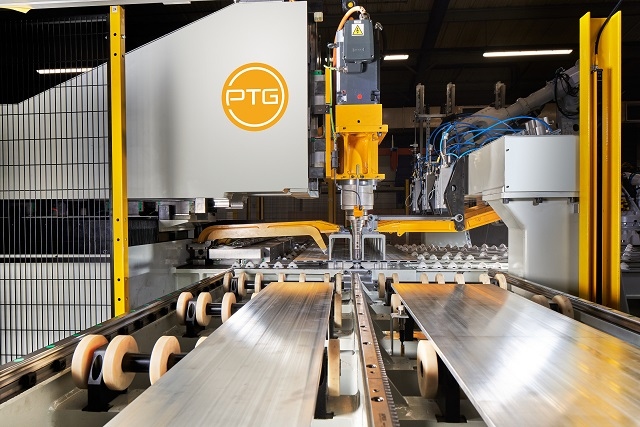PTG opens £1.6M friction stir welding research centre
Date published: 07 December 2020

Precision Technologies Group
Precision Technologies Group (PTG) has opened a new £1.6 million friction stir welding research centre at its Rochdale-based headquarters and machine tools manufacturing facility.
The new centre offers exciting opportunities for prototyping, product and child-part development, materials testing, production trials and low-volume production.
“Our FSW research centre has been established to assist manufacturers in developing new products and processes, as well as better understanding the immense capabilities that PTG Powerstir machines offer,” commented PTG regional sales director, Mark Curran.
“By increasing their knowledge of the FSW process, we can also assist Tier 1 and Tier 2 automotive supply chain businesses in becoming more confident and proficient in tendering for manufacturing projects they may not have previously considered.”
He added: “With governments around the world setting increasingly ambitious targets for the wholesale switch to electric vehicles. Now could be a particularly good time for organisations who have yet to embrace the advantages of friction stir welding for the production of components such as vehicle panels, skateboard chassis and battery cell housings, to get in touch with us.”
PTG Powerstir FSW machines have long been a preferred choice for transport applications globally.
Aimed directly at manufacturers of skateboard chassis structures, the dual weld-head process developed by PTG ensures that a tight weld-flatness tolerance is achieved during battery tray floor construction.
The machines provide an even and stable welding process – achieved thanks to the company’s unique ‘matched’ dual-force control systems and balanced upper and lower head welding parameters. The result is exceptionally stable friction stir welding, producing matched weld seams with balanced heat input which minimises post-weld distortion.
As aluminium extrusion lines usually produce panels of 300 mm to 600 mm wide, PTG has also developed a fully automated, high-output Powerstir FSW production cell for the rapid friction stir welding of multiple extrusions, to create single structures for fabrication into battery tray floors. These structures are typically up to 2.4 metres wide.
Mr Curran added: “In addition to providing a state-of-the-art means of joining metals and achieving extremely high-strength results, it is also important to consider that in many instances, the use of friction stir welding also allows for reduced wall thickness – an important aspect in reducing vehicle weight.
“As the friction stir welding process generates very little heat, the crystalline structure of the metal remains unchanged, retaining its original strength. There is no need for inert gas, no need for heat-treating post weld, and no requirement for additional surface finishing.”
Powerstir applications for electric vehicles also include battery tray floor assemblies, battery trays and boxes, chassis and structural components, control box panels, vehicle body panels, brake regeneration systems, and coolant units and heat exchangers.
Do you have a story for us?
Let us know by emailing news@rochdaleonline.co.uk
All contact will be treated in confidence.
Most Viewed News Stories
- 1Royton haulage firm fined after Rochdale dad went to work and didn’t come home
- 2Unique colour and sound experience comes to Rochdale in May
- 3Rochdale church to host Camerados public living room
- 4Ogden family announces intention to invest £2m in Rochdale AFC
- 5Man convicted after police car filmed driving dangerously in Kirkholt
To contact the Rochdale Online news desk, email news@rochdaleonline.co.uk or visit our news submission page.
To get the latest news on your desktop or mobile, follow Rochdale Online on Twitter and Facebook.



